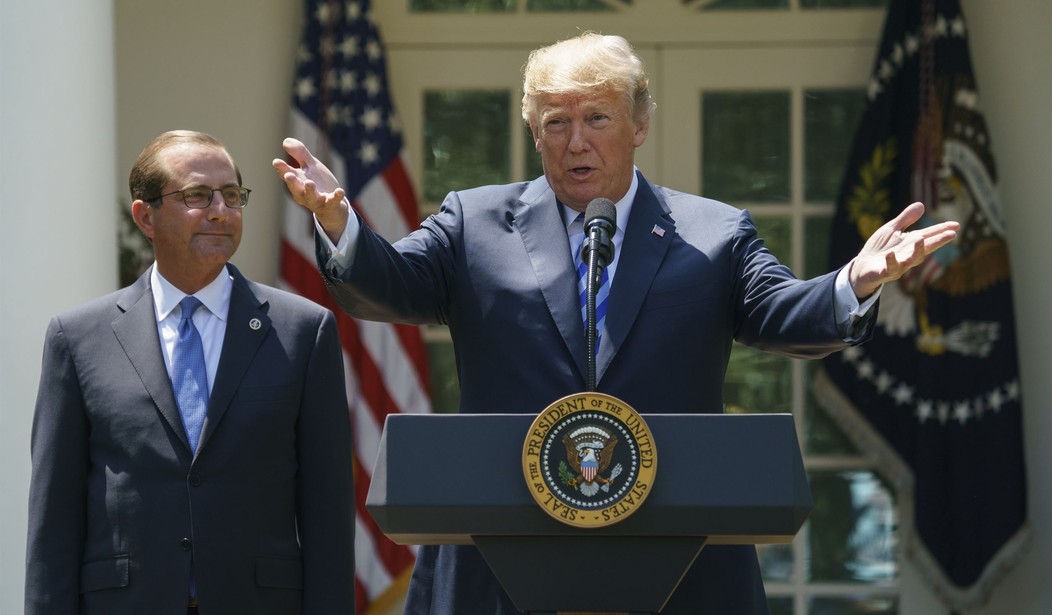Last week, President Trump took an important step towards lowering drug prices for the American public. By signing into law the Patient Right to Know Drug Prices Act and the Know the Lowest Price Act he fulfilled an earlier promise to end the “gag order” which prevented some customers from knowing the cost of drugs at the pharmacy counter. This is the start of a long process to bringing much needed transparency and competition to the pharmaceutical industry and one that will require the president to keep a laser focus on the true drivers of costs.
Reining in the cost of healthcare has been at the forefront of voters’ minds for some time now. While the cost of health insurance has captured most of the headlines, the ever-increasing cost of prescription drugs has become an increasingly hot button issue for voters as well.
President Trump, in a Rose Garden announcement in May of this year laid the groundwork for lowering prescription drug prices. In addition to highlighting what the administration had already done to control costs, the president called upon pharmaceutical manufacturers to engage in free market tactics to lower skyrocketing drug prices and promised “massive” voluntary drug price cuts within two weeks of the announcement.
A recent Associated Press analysis finds that big pharmaceutical companies are not doing their part and additional efforts may be necessary. According to their report it is business as usual for these drug companies. During the first seven months of this year there have been 96 drug price hikes for every price cut and when 24 large drug companies were asked this summer if they planned to cut drug prices, none said they had any plans to do so.
In an attempt to keep encouraging downward price pressure on brand name drugs, Health and Human Services Secretary Alex Azar has proposed a new rule that would require drug companies to put the price of a drug in their TV ads. However, before he even made the proposal, Pharma sought to water down the rule, by volunteering to instead show a link to their own websites for customers to get pricing information. The drug companies know that most patients aren’t going to follow a link in a TV ad, and if they do, then the drug companies can frame the price any way they like, using insurance co-pays and other methods to distort the list price of the drugs.
Recommended
Part of the problem is the administration’s reluctance to address the role drug manufacturers themselves play in driving the price of branded drugs. If their reluctance to voluntarily bring down drug prices or disclose their list prices has shown us anything, it is that they will not be the most proactive partners in this process.
Accounting for 88 percent of the cost of a branded drug, manufacturers are by far the biggest driver of what you pay at the pharmacy counter. While that would seem like a logical first step to address much of the focus has instead shifted to curtailing the very system of negotiated discounts and rebates that brings the only semblance of market forces to the prescription drug market.
Pharmacy benefit managers or PBMs serve as one of the few checks against the constant stream of cost increases that big pharmaceutical companies levy on American consumers. An economic analysis found that they save the average American $491 in drug costs annually and FDA chief Dr. Scott Gottlieb credited the large buying power and formularies of PBMs with fostering generic drug competition that generated “$253 billion in savings in 2016 alone.”
But big Pharma has spent millions of dollars on lobbyists and PR campaigns to spread the notion that this kind of competition actually leads to increased costs.
Drug manufacturers contend that they must artificially inflate list prices in order to compensate for the rebates and discounts secured by these private sector actors. A new study from Tony LoSasso of the University of Illinois Chicago and Ike Brannon of the Cato Institute not only found no correlation between drug rebates and cost increases, but found that eliminating rebates would lead to “drug companies making higher profits without doing anything to earn them.”
Another common argument for ending this system is that list prices for drugs would be unilaterally lowered by manufacturers as they would no longer need to artificially inflate them to compensate for discounts and rebates. Given the lack of movement in response to direct appeals from our President and Messrs. LoSasso and Brannon’s findings, I would beg to differ.
None of this is to say that drug companies should not be rewarded for taking risks and developing new life saving cures, but when out of control prescription costs are causing 1 in 5 Americans to skip doses of life saving drugs, something must be done to restore the balance between costs and profits.
As the president rightly pointed out in that Rose Garden announcement “the drug lobby is making an absolute fortune at the expense of American consumers.” 77 percent of Americans believe that prescription drug costs are unreasonable and now the American public is looking to Republicans to get these costs under control. The president and Congress must stay the course and address the true driver of increased drug costs. Failure to do so may mean steep costs at the ballot box in this election and beyond.

























Join the conversation as a VIP Member